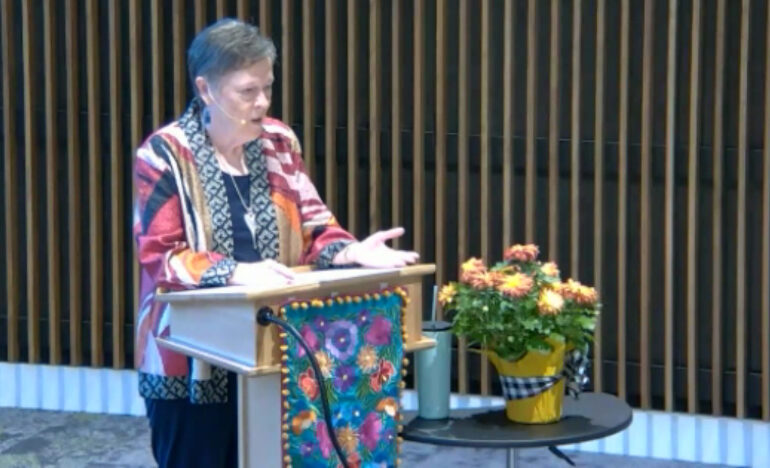Argue, Debate, or Be Constructive?

An Assembling God’s Puzzle video
By Fr. Garry Richmeier
There was an Evangelical Sunday morning TV show whose format consisted of staging debates between traditional Christian and non-Christian authors/writers/speakers. The show would invite one individual from each side of the ideological/religious issue and each would state their beliefs. It had the looks of an actual debate, with each person getting equal time to speak, and a panel of three judges to decide who was the winner of the debate at the end.
Despite the outward appearance of a true debate, which concludes which side gave the better argument, this show was really about proving to viewers that there is no other valid argument than the Evangelical Christian argument. So Sunday after Sunday, the invited non-Christian would be declared the “loser” of the “debate,” and the show would uphold the supremacy of Christianity over other, what it held to be, “heathen” beliefs.
One Sunday, the show invited Deepak Chopra to participate in the debate. Chopra is a well-known author with a background in Hinduism. For his opponent, the producers of the show arranged for an evangelical preacher well known for his bombastic, no-holds-barred style of arguing.
Over and over during the debate, the evangelical preacher would attack Chopra’s beliefs, contending that what he taught was false. He kept trying to get Chopra into an argument about who was right and who was wrong, so that the preacher could “win” (which was the point of the show of course). Over and over again, Chopra simply stated that what he wrote and taught was what to him looked like the truth and reality, but that he could be wrong. He said it was just his opinion, and that his opinion could change in the future if he came across new information or new experience. Both the preacher and the debate judges were at a loss regarding what to do with Chopra since he wouldn’t engage in the black-and-white, either-or arguing that was the basis for the show.
That show reminded me of a very common approach to life we human beings often take, another piece of the puzzle we need to deal with. It seems to be part of our DNA to sort almost everything in life into two categories — right or wrong, good or bad, sinner or saint, like or dislike, smart or stupid, conservative or liberal, etc.
Of course, we do not want to be on the “bad” or “wrong” side, because we fear the shame, embarrassment and ridicule others might level at us. So, we vocally proclaim our being on the “good” side, entrenching ourselves in sort of a righteous bunker mentality, never to give in to the “bad” side. In addition, we demonstrate our “rightness” by demonizing the other side and proclaiming there can be no good in it.
Our tendency as humans to take this approach causes us many problems, like a congress in gridlock, religious wars, family divisions, racial conflict, economic classism, etc. At its basic level, this ideology prevents us from entertaining new possibilities and new information, which prevents us from discovering new ways to solve our present problems and grow beyond our present level of understanding.
The approach demonstrated by Deepak Chopra in the example above tends to work better, and is one which everyone could employ. It includes, first of all, using all available information and experience in formulating a belief or position. It implies that a person does the work of gathering information and ideas from many different sources, and doesn’t just rely on being “spoon-fed” input from one source.
As a person distills that information into one’s beliefs and worldview, they must use as their guide the most basic and most important value of all — love of neighbor and love of self. In addition, as Chopra demonstrated, one must be able to acknowledge that they do not have the whole picture, that there is more out there that might help them grow in their belief and understanding, and that others (even those with different views) may have something of value to contribute.
This implies a willingness to change and adapt one’s views in light of new information. It is similar to the scientific approach. Science posits an explanation of something, but when new information comes along, it changes to offer a more accurate explanation.
Someone using this approach will also recognize that engaging in argument and debate to determine who is right and who is wrong is divisive and a waste of energy. This person will value dialogue and an open exchange of views, knowing that everyone has a piece of the truth, and that dialogue is the path to coming to a greater understanding of the truth together.
It is not easy taming our instinct for debate and argument and proving who is “right.” It takes much self-control, humility, confidence, flexibility, and discipline. But like anything else, we can get better at it with practice. And the results can be well worth the effort.
All of the videos in this series can be found here: Assembly God’s Puzzle.
Never miss an article published on the Renewal Center website: Sign up to receive our newsletters.
[Fr. Garry Richmeier, a Precious Blood priest and spiritual director, holds a Master’s of Divinity Degree from St John’s University in Collegeville, Minnesota, and a Master’s of Counseling Psychology degree from the University of Missouri-Kansas City. He is a licensed professional counselor and a licensed marriage and family therapist.]
Photo 33585793 | Debate © Agencyby | Dreamstime.com — Argue, Debate, or Be Constructive? — An Assembling God’s Puzzle video
We’d Like to Hear from You!
We’d like to know what you think about this article. Send us a comment using the form below. Do you have a suggestion? Is there something you want to learn more about? Send us a note.
Related

Discover Lectio Divina
Presented by Kathy Keary
This is a recording of “Discover Lectio Divina” presented by Kathy Keary at Precious Blood Renewal Center in Liberty, Missouri, on Oct. 2, 2025.

Do You Hear What I Hear?
By Fr. Garry Richmeier, C.PP.S.
How can we avoid the harmful affects of the polarization that characterizes so much of our lives these days? One step toward this end is to cultivate a greater understanding and appreciation for the idea of relativity in human behavior.
Categories
Assembling God's Puzzle Coffee with Padre Cooking & Spirituality Encounters of the 4th Kind Family Matters Guided Meditations Reflections on the Eucharsitic Prayers Spiritual Resources Taize Prayers Teach Us to Pray The Contemplative Life Traveling with Pilgrims of Hope Uncategorized Videos Week of Prayer for Christian Unity When you need a little help
